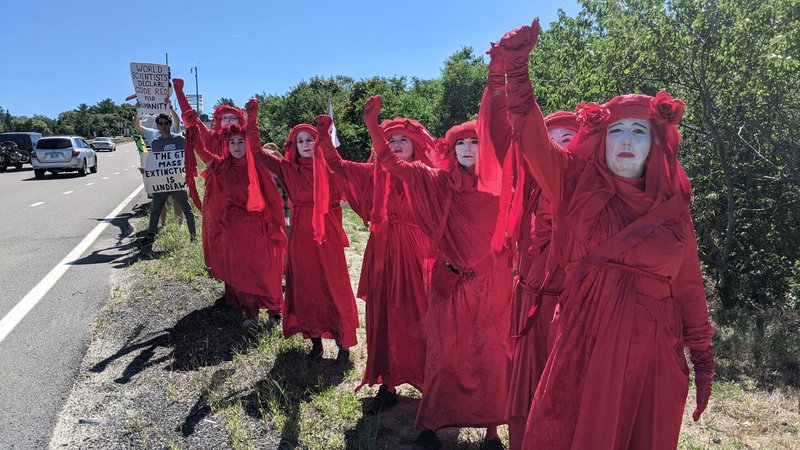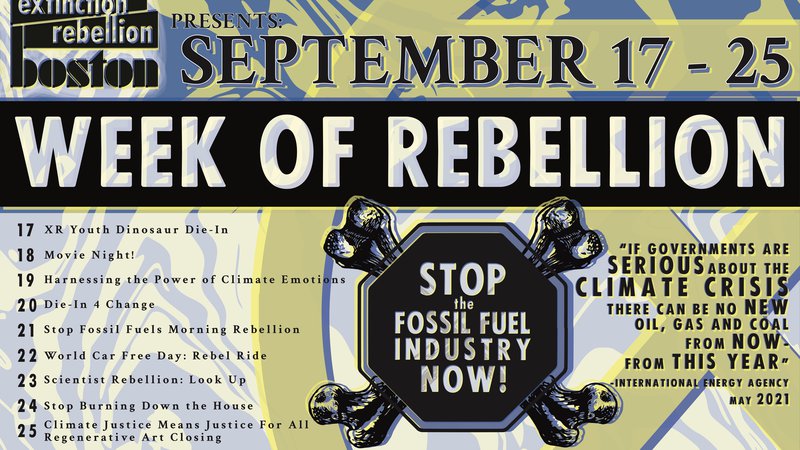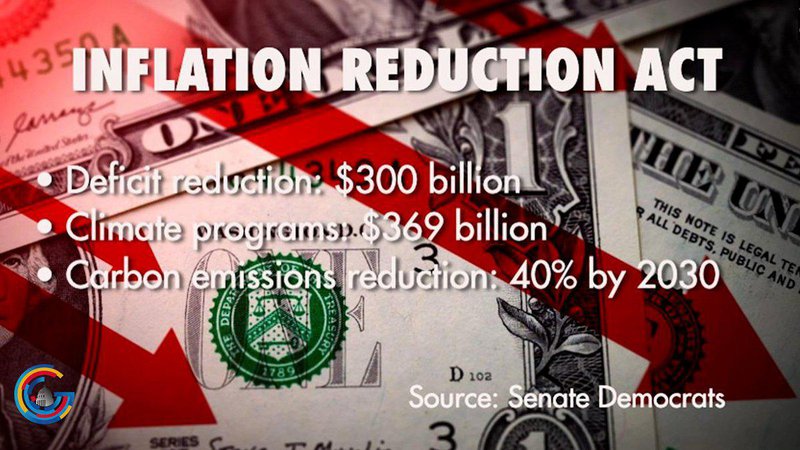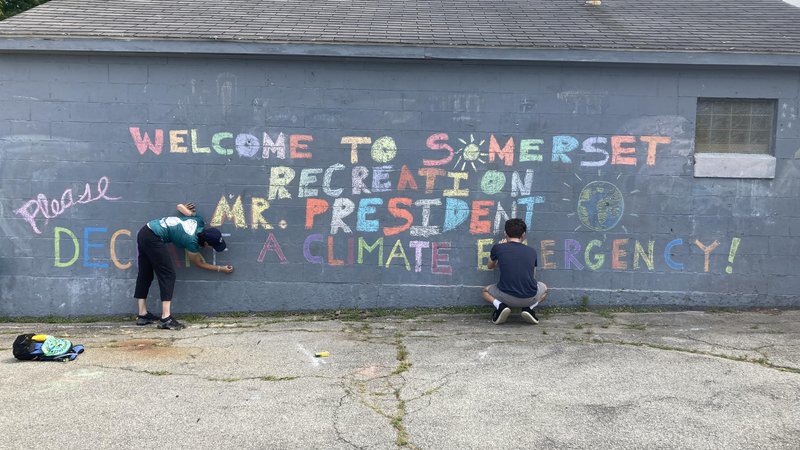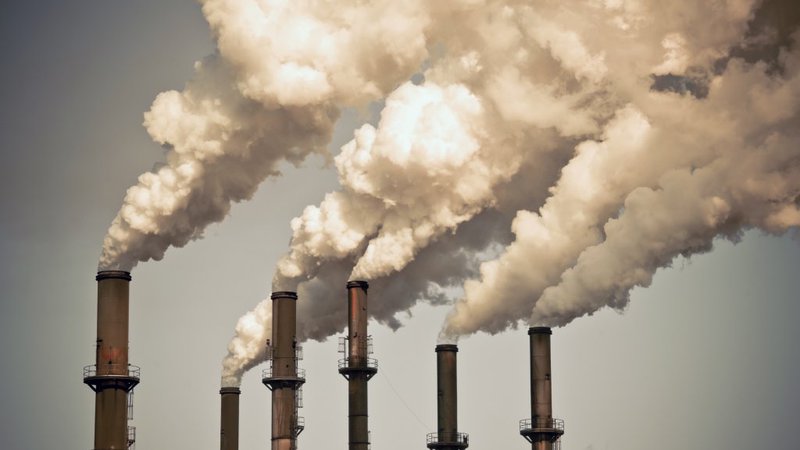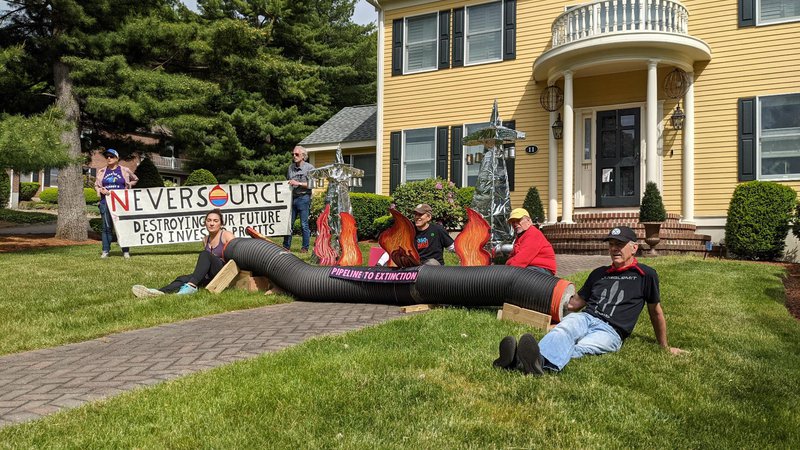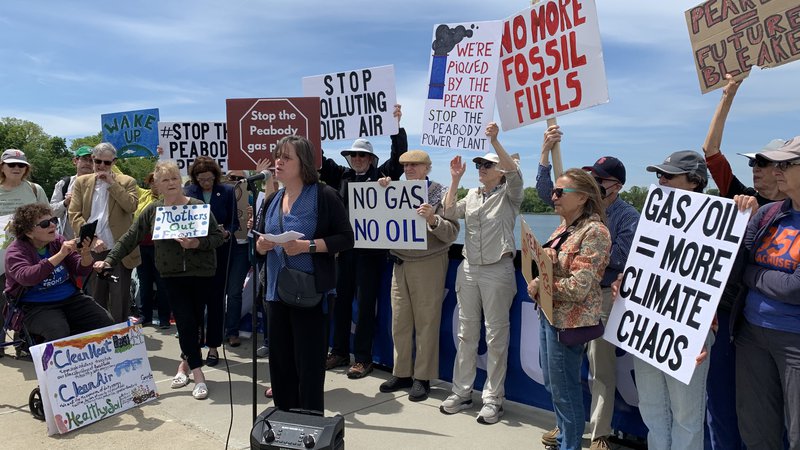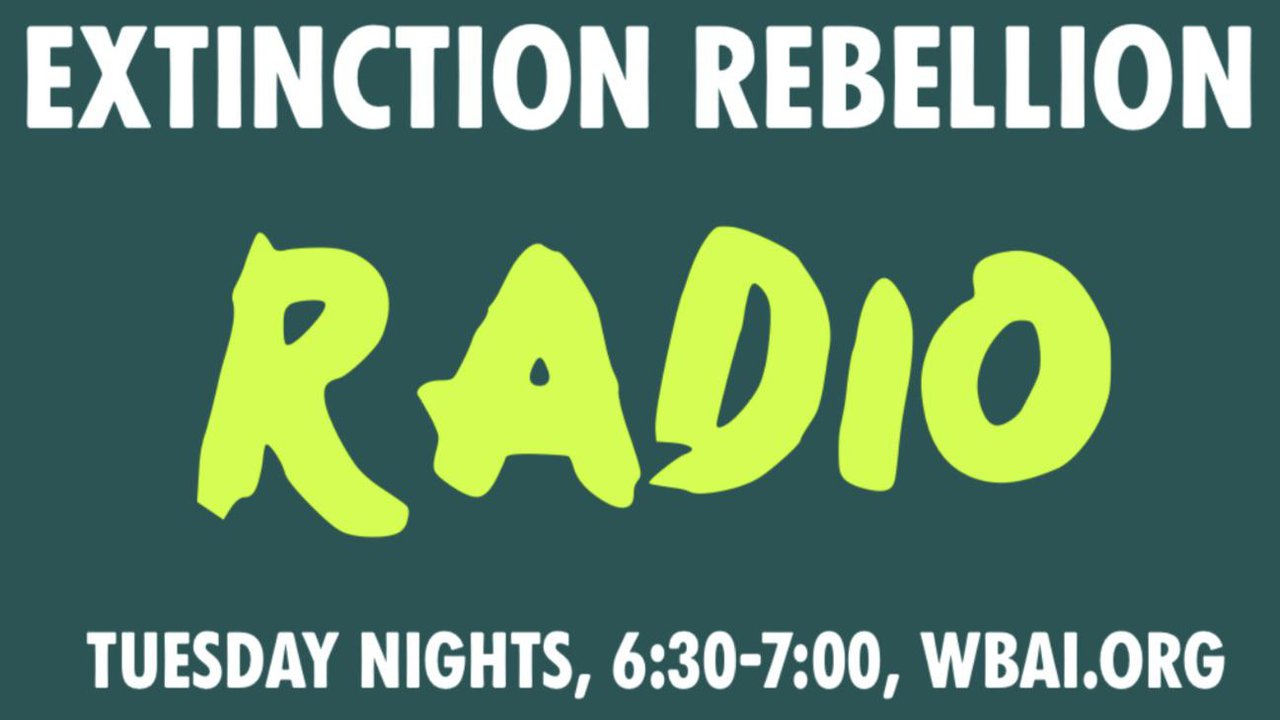
Extinction Rebellion Radio
Join us every Tuesday night from 6:30-7PM on WBAI for Extinction Rebellion Radio. Extinction Rebellion Radio is dedicated to covering weekly news and stories on the climate crisis through conversation, interviews and expert perspectives. Our stories focus on our rebellion against the climate crisis with a focus on the systems that have brought us to crisis and the complexities, people, and nuances that exist within them.
This show is rooted in Extinction Rebellion’s four demands: government must declare a climate and ecological emergency, government must halt biodiversity loss and reduce greenhouse gas emissions to net zero by 2025, government must be led by the decisions of a Citizens’ Assembly on climate and ecological justice, and we must prioritize the most vulnerable people to create a livable planet for all.
Previous episodes are listed below.
Episode 1: Dec. 11, 2020
Covers how the Trump administration is actually encouraging pollution, and discusses two chapters from the book 'This Is Not A Drill' showing that Extinction Rebellion does not have one unified ideological program, and why that's a good thing.
Episode 2: Dec. 18, 2020
Drilling in the Arctic National Wildlife Refuge, the Trump administration's thought police-like restrictions on pension funds, and a montage on fascism and the climate crisis.
Episode 3: Feb. 2, 2021
A short overview of Extinction Rebellion as an organization, the Biden administration's initial orders on climate, and a victory for Nigerian farmers over Shell corporation.
Episode 4: Feb. 9, 2021
An interview with Rev. Chelsea MacMillan, one of Extinction Rebellion's experts on regenerative culture, exploring how to stave off deep depression amid relentless bad news on climate.
Episode 5: Feb. 16, 2021
Drilling in the Arctic National Wildlife Refuge, the Trump administration's thought police-like restrictions on pension funds, then a montage on fascism and the climate crisis.
Episode 6: Feb. 23, 2021
Interview with author Ben Tippet on class and the climate crisis. We cover the ultra wealthy hiring private fire fighters, airport protests in the UK, and more.
Episode 7: March 2, 2021
This week we talk about extreme weather events and the Texas power grid, with a look at walking in the snow while Black. Or a more snappy expression: The Climate Crisis is messing with Texas.
Episode 8: March 9, 2021
An interview with Nora Maynard, singer, music teacher, and climate activist. We talk about how and why to sing at protest and how music can be part of changing the world.
Episode 9: March 16, 2021
Pollution in cancer alley, what's not working in climate science communication, and an environmental lawsuit in California
Episode 10: March 23, 2021
This week on Extinction Rebellion Radio we talk with the founder of Austin Mutual Aid, a grassroots community aid hub that has been active in the wake of the climate-related disruptions in Texas. Most media have left out the experience of individual Texans helping each other, and that's what we'll be covering.
Episode 11: March 30, 2021
This week we will talk about the Amazon basin turning from a carbon sink into a net carbon source—bad news. A recent meeting between the Biden administration and all of the major oil companies and how they've kept secret who attended. An oil spill in California that our co-host and her neighbors experienced first hand. The major historical precedent for five-year social transformation with huge collective effort and sacrifice, which is exactly what we need to solve the climate crisis. The historical precedent is World War II. And, finally, methane-eating bacteria. Yum yum.
Episode 12: April 6, 2021
This week we are talking about a major piece of legislation pending before the New York State legislature called the Climate Community Investment Act. We do an interview with Xaver Kandler, an organizer helping lead the fight for this. You will hear about how this bill, in effect, redistributes resources from fossil fuel companies to climate justice communities, green energy, and unionized green jobs. You'll also hear about what the bill does not do. You hear about where we are in the state legislative session, and what to do if you like the sound of it. This is time-sensitive major climate legislation, and we talk all about it.
Episode 13: April 13, 2021
This week we talk about what absolute zero emissions means, hopefully the first of many segments on that. We hear the latest numbers on greenhouse gas emissions—remember that 350 parts per million target? And helping the environment by making roads out of recycled plastic.
Episode 14: April 20, 2021
We look at President Biden's virtual Climate Summit and begin a series on the Biden plan, the Green New Deal and the Paris Accord which fall short of the goals needed in this climate emergency.
Episode 15: April 27, 2021
This week we have a short comment on President Biden's major recent announcement targeting a 50 percent fossil fuel emissions cut, with nothing about how to do it. From our perspective, this target is halfway there. Then most of the program is an interview with Sarah Jaquette Ray of Humboldt State University. She has written about the racial dimensions of climate anxiety. In her view, fragility among whites and historical oppression among people of color interacts with climate anxiety in different ways. So what's the same, what's different, what are the racial dimensions of climate anxiety? We get into it.
Episode 16: May 4, 2021
Steven Donzinger is an American political prisoner. In fact, he is effectively Chevron's political prisoner. Donzinger is one of the attorneys who won a landmark case against Chevron for its extensive pollution in Ecuador, with an initial fine of $18 billion. As payback, and as part of their efforts to avoid paying the money, Chevron has hounded Donzinger. They have used international tribunals and the U.S. Federal Court System to prosecute him on bases that have never received a proper evidentiary presentation. He joins us under house arrest, from his apartment, wearing an ankle bracelet, to discuss his experience and the ongoing situation in Ecuador.
Episode 17: May 11, 2021
"God $ Green: An Unholy Alliance" is a recently released short documentary that addresses how potent social and economic forces prop up climate denialism. It tells the story of how these forces assembled a veritable army of climate skeptics in the name of god, country, and capitalism. We have Jeanine Butler, the co-producer and co-director of the film with us this week, along with Kurtis Schaefer, Francis Myers Ball Professor of Religious Studies at the University of Virginia, who co-directs the lab that released the documentary.
Episode 18: May 18, 2021
We speak with Scott Howland, author of the article entitled "The Nature of the Beast: Fossil Fuel Corporations, the Cornwall Alliance, and Climate Change Denial." The Cornwall Alliance bills itself as a network of evangelical Christian scholars, mostly natural scientists, economists, policy experts, theologians, philosophers, and religious leaders dedicated to educating the public and policy makers about biblical earth stewardship, economic development for the poor, and the gospel of forgiveness of sins and reconciliation with god by grace. Sounds innocent enough, but Scott Howland offers an entirely different characterization altogether. The Cornwall Alliance, he tells us, is in reality an apparatus of justification for climate change denialism and thus a perpetuation of the capitalist system that continues to accelerate the present climate crisis.
Episode 19: June 8, 2021
This week we are joined by Wyatt Oswald. He is Professor at Emerson College, and Research Associate at Harvard University, and he is a climate scientist, a real climate scientist. He drills into mud and ice to measure long term trends in climate change. He explains those methods to us and it's actually pretty interesting—free of jargon and technicalities. More importantly, Wyatt talks about the importance of rapid climate change. You hear people say there have been big changes in temperature over the millennia, warming and cooling and Ice Ages. The problem now is that it's happening very fast, within the space of decades, and he explains why that can be catastrophic.
Episode 20: June 15, 2021
The existing major proposals on climate all presume keeping our economic system intact. This week we talk about some different frameworks that would make addressing the climate crisis much easier. So we contrast the Biden Plan, the Green New Deal, and the Paris Climate Agreement with Degrowth and Doughnut Economics, as it's been called. We talk about ways of thinking that are fundamentally different from the growth-oriented acquisitive current economic system.
Episode 21: June 29, 2021
Terms like net zero, real zero, absolute zero, carbon neutrality, and so on refer to radically different things. Professor Doreen Stabinsky from the College of the Atlantic, and author of the recent report "Chasing Carbon Unicorns," joins us to explain the differences and articulate why approaching real zero quickly is the only way to avoid massive global temperature increases.
Episode 22: July 6, 2021
Among our topics this week, we are talking about the upcoming IPCC report that is devastating and is identical to what Extinction Rebellion has been saying all along. We are talking about climate emergency declarations that aren’t called that and should be, and we are talking about some good news about preventing emissions from rotting Spanish fruit.
Episode 23: July 13, 2021
This week we interview Larry Ward, author of America's Racial Karma. Larry is an ordained Buddhist practitioner and author of the recent book, America's Racial Karma. In this interview he connects his Buddhist analysis of race in the United States to the climate crisis. The conversation shows how the suffering of the earth cannot be disentangled from America's racial karma; both proceed from acquisitive intentions.
Episode 24: July 20, 2021
Asking people to use less electricity (voluntary reductions) has not seriously reduced emissions. So what about mandatory reductions? How would we ration electricity, for industry and households, and how would we get buy-in from the general public to do this? We explore these questions in this week's episode of XR Radio.
Episode 25: August 3 , 2021
Existing energy storage is inadequate to fully decarbonize the electrical grid. Our guest this week is inventing a technology to change all that: a way of storing very high levels of heat that can be converted to electricity on demand. If successful, this would dramatically increase our ability to store electricity, like having a huge battery. We could then have electricity from solar power even when there is no sunshine, and from wind power even when there is no wind. Tune in to hear our talk with Asegon Henry, Associate Professor of Mechanical Engineering at MIT, to hear about his invention.
Episode 26: August 10 , 2021
It seems like most industrialized countries are either flooding or on fire in July and August of 2021. We give the run-down, the global scope of which hasn't always been appreciated by mainstream media.
Episode 27: August 17, 2021
We interview Alice Arena from Fore River Residents Against Compressor Station (FRRACS). The Weymouth Compressor Station is part of a fracked gas pipeline. It is the largest facility of its type that is as close to a major city (near Boston). FRRACS has been fighting it in the courts and in the streets for seven years now. They haven't definitively stopped it, but they did delay it. We hear from Alice about what this station is, the dangers it poses, and how their group got up and running.
Episode 28: August 24, 2021
This week: Our perspective on the collapse of Atlantic ocean currents, which is getting more likely and would be irreversible. We express our exasperation with how climate scientists get quoted in news media: so many qualifications and hedging that confuses people. And why climate change contributed to the recent protests in Cuba.
Episode 29: September, 7, 2021
This week we start the first of an occasional series on how climate change impacts regions around the world. Azerbaijan is a good place to start: unfamiliar to many Americans and not a coastal or exceptionally hot country, so not obviously in the line of fire. And yet they already have severe water shortages caused by climate change. The water supply was once about as reliable as in the US, but now 50% of the time there is no running water. Rovahan Abbasov, head of the United Nations water program in Azerbaijan, explains the situation to us.
Episode 30: September, 14, 2021
Terms like net zero, real zero, absolute zero, carbon neutrality, and so on refer to radically different things. Professor Doreen Stabinsky from the College of the Atlantic joins us to explain the differences and articulate why approaching real zero quickly is the only way to avoid massive global temperature increases.
Episode 31: September, 21, 2021
With some technical difficulties this week that we don't expect to recur, we are bringing you a highlight of our show. This week we interview Larry Ward, author of America's Racial Karma. Larry is an ordained Buddhist practitioner and author of the recent book, America's Racial Karma. In this interview he connects his Buddhist analysis of race in the United States to the climate crisis. The conversation shows how the suffering of the earth cannot be disentangled from America's racial karma; both proceed from acquisitive intentions. Back next week with an all new episode on militarism and the climate crisis
Episode 32: September, 28, 2021
Afghanistan, militarism, and our climate crisis. Since the beginning of the Afghanistan war in 2001, the U.S. military has emitted over 1.2 billion metric tons of greenhouse gases. We'll also hear from Professor Neta Crawford of Boston University in the first of several discussions of the military dimensions of climate change
Episode 33: October, 5, 2021
This week on XR Radio, we hear about XR's recent actions in New York: Blocking three major banks simultaneously. Citigroup, Bank of America, and JP Morgan Chase are among the largest funder of fossil fuels in the world and XR activists disrupted their flagship branches or headquarters buildings with creative non-violent civil disobedience. We hear about how news media were denied access to at least one of the blocking sites and discuss some of the implications with XR activist Jack Baldwin, who also spoke at a coalition building event called Rising Together. Then we round out the show with a report on the spike in murders of environmental activists worldwide last year.
Episode 34: October, 12, 2021
Alycee and Matt will be talking about our climate crisis and migration. There's a whole lot of fencing going on—fencing of national borders trying to keep out migrants. But rather than fences and barriers, we need planning on an international level for the migration that's going to come from the climate crisis. On this show we are going to explain why. Along the way we talk about animal migration and insect migration. Some species can make it and some can't. And we bring you some information about Lake Tanganyika in south-central Africa bursting its banks due to climate related causes.
Episode 35: October, 19, 2021
This week we talk about Cop 26. We talk about Norway and Australia expressing their determination to burn more oil and gas and coal and wreck the planet still further, and we end up with some good news which we desperately need. There is a little bit of fun too when we learn about the Mooloo.
Episode 36: October, 26, 2021
India Walton, Mayoral candidate in Buffalo, New York, comes on the show this week. We discuss mainly her environmental and climate-related ideas and citizen's assemblies. She is the only candidate on the ballot after defeating the incumbent in a primary election, although that incumbent is now running a write-in campaign against her. The election is next Tuesday, November 2. We comment on the various senses of 'apolitical' within XR and the implications of interviewing a political candidate
Episode 37: November, 2, 2021
This week on Extinction Rebellion Radio we speak with Sue Durling and Maria Ogden, two grandmothers from New England who get themselves arrested at climate protests. As they explain, it's not about getting arrested. It's about bringing attention to the climate crisis that they fear will have a terrible impact on their grandchildren's lives. Through them we hear eyewitness accounts of an action that blocked the home of Massachusetts Governor Charlie Baker, an action that blocked the Manhattan headquarters of JP Morgan Chase, and an action at the Bow Coal Plant in New Hampshire where there might have been more police than protesters. So tune in to WBAI 99.5 FM this Tuesday, and every Tuesday, for Extinction Rebellion Radio. This is not a rebellious conversation you want to miss.
Episode 38: November, 16, 2021
This week on Extinction Rebellion Radio, we talk about the EMPTY promises of Cop 26. Governments from around the world in Glasgow to perform a ritual of talking about climate change while doing absolutely nothing to tackle halt our unfolding climate emergency. As the world faces increasing climate catastrophes that displace millions, accelerate extinction, threaten our food supply, and compromise our health, leaders gathered not to 'phase out' but to 'phase down' subsidies for oil and gas. And no surprise there. The fossil fuel industry constituted the biggest delegation at Cop 26—they literally had more lobbyists than any country had delegates—a delegation that continues to steer humanity toward collective disaster.
Episode 39: November, 23, 2021
"Close the 1.5 degree Celsius gap to stay alive." That's a quote straight out of a World Health Organization report released last month—a report we will be discussing this Tuesday at 6:30 p.m. on Extinction Rebellion Radio. No mincing words. No sugar coating. Just the plain truth: To stay alive, we must close the 1.5 degree Celsius gap. We'll also be speaking with members of the Coalition of Concerned Medical Professionals about our climate crisis and health. And finally we have a few words to say about the Democratic establishment's derailing of India Walton's bid to become Mayor of Buffalo, New York.
Episode 40: November, 30, 2021
This Tuesday, we continue our series on militarism and the climate crisis, speaking with Lorah Steichen from the Institute for Policy Studies. We talk about our wars for oil, how our federal spending on the war machine hamstrings our ability to address climate change, and the ways climate change and border militarization are inextricably linked. So go ahead and mark your calendars for Tuesday at 6:30 p.m. eastern for wbai.org, or catch our recording after.
Episode 41: December, 7, 2021
This week we hear from Raouf bin Mohammed, a coordinator of Extinction Rebellion Tunisia. A successful political revolution is still fairly recent in this North African country. As our guest explains, this has left Tunisians with a sense that any level of change is possible. Tunisia is also directly in the path of climate change: Infrastructure and services are concentrated in coastal cities. We hear all about it this week from Extinction Rebellion Tunisia.
Episode 42: December 21, 2021
Before there was Cop 26, there was Pre-Cop, a negotiating meeting between second-tier delegates held this past September in Milan, Italy. Extinction Rebellion made a protest, blocking traffic, creating a huge swooping bird installation, and going to jail. It caused at least a brief disruption of the conference. On the show this week to talk all about what happened and how it was organized is Beatrice Costantino of XR Italy, who joins us remotely from Rome.
Episode 43: December 28, 2021
Extinction Rebellion has four demands. Citizen's Assemblies are #3—a novel political solution that might impact the response to the climate crisis. In this episode, Bob Kolodny, who coordinates XR New York's Citizen's Assembly working group, shares some recent examples of assemblies in other parts of the world and what came of them, and talks about how meaningful it might be if one happened in New York
Episode 44: January 4, 2022
Shooka Bidarian is Environmental Correspondent for Marjan Television, a Farsi-language network based in London. She recently received the Alfredo Sirkis Memorial Green award for her work on our climate crisis. We'll be talking about how global heating is affecting Iran as well as the Iranian regime's reaction to both climate change and climate activists. We'll also hear about her documentary on Cop 26, the first major documentary on climate change in Farsi, which premiered in December
Episode 45: January 11, 2022
This week, XR Radio has a few things for you. We complete our conversation with Shooka Bidarian, Environmental Correspondent for Marjan Television, an Iranian news network not based in Iran. We hear about that time that every Democrat in the U.S. Senate voted against basic climate action—that was the Kyoto protocol. And like almost every week another extreme weather event; this one in British Columbia. It was the most expensive natural disaster Canada has ever seen
Episode 46: January 18, 2022
What happens to even modest climate legislation. Domestic policy is dominated by Joe Manchin. He has single-handedly stalled the entire Biden administration's entire Build Back Better agenda, which includes even the modest, unsatisfactory climate proposals. We get into those proposals and the senator's financial interests in coal. Yep, he's personally profiting from burning coal. Plus some other recent climate-related news: Smog in India and Bitcoin mining in El Salvador.
Episode 47: January 25, 2022
We continue our series on the climate crisis and militarism. We bring you new material from an interview with Neta Crawford, Chair of Political Science at Boston University. As we look at one climate catastrophe after another, it becomes clear that the things we care about cannot be secured by people with guns. In fact, we need to re-think altogether what we mean by "security." Also we look at Russia's build-up on the Ukrainian border through the lens of climate change and the role fossil fuels play in the dangerous stand-off between Russia and NATO
Episode 48: February 1, 2022
Cop 26 is just about faded from public consciousness and that's just what world leaders want. Keep our attention on anything else besides the catastrophes to come. Forget about how they didn't do anything about the climate crisis. There were no positive steps agreed to. No action, only talk of doing things decades from now. Well on this week's show we're going to round out our coverage of that event with items that we didn't get to before. Illegal logging in Brazil allowed to continue for 27 more years, targets like 2070 getting applause from the delegates, we talk all about it on Extinction Rebellion Radio.
Episode 49: February 8, 2022
Queer Voices in the Climate Movement: A radio adaptation of a talk about about how queer people and communities are poised to be disproportionately impacted by climate change due to vulnerabilities like youth homelessness, the climate-vulnerable location of culturally safe spaces, and more. And we talk about the history of queer activism. Guests are James Comiskey and Michael Kozuch
Episode 51: February 15, 2022
What happens to even modest climate legislation. Domestic policy is dominated by Joe Manchin. He has single-handedly stalled the entire Biden administration's entire Build Back Better agenda, which includes even the modest, unsatisfactory climate proposals. We get into those proposals and the senator's financial interests in coal. Yep, he's personally profiting from burning coal. Plus some other recent climate-related news: Smog in India and Bitcoin mining in El Salvador.
Episode 52: February 22, 2022
Why does Extinction Rebellion do what it does? Why civil disobedience instead of something else? Why not focus on legislation? Why not make long-term social transformation the focus of today's climate activism? Allen McGonagill from the Strategy Group of XR Boston summarizes the strategy of XR this week, and joins us again next week to discuss what he's presented.
Episode 53: March 1, 2022
Back on XR Radio tonight is Allen from XR Boston. Part 2 of 2—this one is him discussing his XR Strategy talk with the hosts. As always it's 6:30-7 p.m. eastern, 99.5 FM in New York or live streaming at wbai.org from anywhere. Recordings get posted on our website later [you can use similar/same text from last week as you wish—topics are the same, just more interaction this time]
Episode 53: March 8, 2022
Militarism and the climate crisis. You've probably heard it said that the climate crisis is a 'threat multiplier' for national security. This week we flip the script and ask: Is the national security framework a climate crisis multiplier? Is militarism making our climate crisis worse? We spoke with John Feffer of the Institute for Policy Studies.
Episode 54: March 15, 2022
Ukraine. What’s happening there is deeply entwined with the climate crisis. It’s dependence on fossil fuels that’s creating both of these crises. Russia is an expansionist state that exports fossil fuels. This is the structure of what’s happening. As long as both of those conditions are present, we are going to have to worry about what Russia will do next. Join us to hear all about it this Tuesday at 6:30 p.m. eastern. This is not a rebellious conversation you want to miss.
Episode 56: March 29, 2022
This Tuesday: Nuclear energy and the climate crisis. Our guest is Marie Inoue is co-founder of the Manhattan Project for a nuclear-free world. She explains some of the reasons nuclear energy is environmentally harmful. We also plan a future show making a more pro-nuclear energy case.
Episode 57: April 5, 2022
Don't Look Up is by far the most prominent movie yet made about climate change. We discuss it with Jack Baldwin, a published expert on Japanese film and an occasional contributor to XR Radio.
Episode 58: April 19, 2022
This week, we continue to flip the script on the Pentagon mantra that climate change is a threat multiplier. We've asked several experts on our show to answer the question: is the US national security framework a CLIMATE CRISIS multiplier? Answering this week is Claire Nelson of Futures Forum, and member of Women of Color Advancing Peace, Security, and Transformation. She offers insights on the kind of security we will need as the climate crisis unfolds.
Episode 59: May 3, 2022
The Spring Rebellion was about two weeks of protest activities all around New York, and also a big march in Boston. The Spring Rebellion targeted Wall Street, the news media, and the federal government—three entities that have the ability to act on the climate emergency and mostly don't. There were marches. There were songs. There were arrests. And we talk about it this week on Extinction Rebellion Radio.
Episode 60: May 10, 2022
We've done a trilogy of episodes on climate change and militarism where we flip the script. Instead of asking is climate change a threat multiplier, we ask is our militarized polity a climate change multiplier. This week is the third episode. Basav Sen of the Institute for Policy Studies joins us to explore this question.
Episode 61: May 17, 2022
Our new climate reality: It's flooding in South Africa and while it's raining ash in New Mexico, Roe vs. Wade as climate connected, and some good-ish news on Bitcoin and microplastics.
Episode 62: May 24, 2022
What can you not say about climate if you want Senate confirmation to a US government position? Also a way to filter microplastics, and maybe just maybe decrease Bitcoin energy consumption by 99% and wonder of wonders, the American Conservative Coalition favors a massive investment in green energy.
Episode 64: May 31, 2022
We talk about the Buffalo mass shooter who, believe it or not, talked about climate change in his manifesto. We are mindful of the danger in engaging with this material, but we think it's more dangerous not to. He is of course absolutely wrong in his diagnosis of the situation and who he is blaming for it. we seek to debunk some of the twisted and hateful ideas that some white supremacists are deploying around climate change.
Episode 65: June 7, 2022
We discuss the recent statement by UK Met Office that there's now a 50/50 chance that the world will warm more than 1.5 Celsius in the next 5 years. Does that mislead the public about the severity of the climate crisis, since there's 100% chance of exceeding 1.5 Celsius eventually? And this leads to a broader conversation about the media's motivations in covering climate change.
Episode 66: June 14, 2022
Has the Biden administration done ANYTHING right on climate? Frankly, no. We get into it. And a New York City-sized piece of Antarctica ice shelf has broken off, the first time this has happened on the eastern side of Antarctica. It was previously thought to be stable. In more joyful news, the good folks of Baton Rouge held a climate activism celebration.
Episode 67: June 21, 2022
This week our guest is Derek Seidman, Director of the Public Accountability Initiative, also known as Little Sis. This group details the connections between powerful people and organizations, as in lobbyists, politicians, financiers, affiliated groups, and more. Climate activists can use this information to push the right people to get action on the climate emergency.
Episode 68: June 28, 2022
In observation of Pride month (and as filler for a show with a new, long fundraising pitch), we use about half of this earlier show: Queer Voices in the Climate Movement is a radio adaptation of a talk about how queer people and communities are poised to be disproportionately impacted by climate change due to vulnerabilities like youth homelessness, the climate-vulnerable location of culturally safe spaces, and more. And we talk about the history of queer activism
Episode 69: July 12, 2022
We discuss the recent Supreme Court ruling West Virginia vs. EPA. In that ruling the court dropped a dirty bomb: Now government agencies can't regulate emissions. A nightmare for climate change—this eviscerates our ability to respond to this crisis. This has big implications for climate and for how the U.S. government operates more generally. Join us as we talk about it.
Episode 70: July 19, 2022
This week we are talking about extreme weather in Europe. Almost everywhere they are having massive forest fires and droughts. The River Po is running dry and starting to run with salt water. The entire country of Portugal is under severe warning for forest fires. We talk about Italy, France, the United Kingdom, Spain, Portugal, Croatia, Morocco, Turkey, and Greece. All these places are facing extreme weather and first just in the past week.
Episode 71: July 26, 2022
This week we mention a few things--one is the SAFE Cities campaign that connects local efforts to stop fossil fuels with community leaders, a climate action in Ottawa endorsing a fossil fuel non-proliferation treaty, a recent study on the impact of space tourism, and the importance of listener supported radio and how you can help.
Episode 72: August 2, 2022
Sri Lanka is not a case of climate policy gone wrong. Climate deniers are saying that the political chaos in that country is due to climate policy. Well that's not true. We explain what's gone wrong in Sri Lanka, why the situation has little to do with climate, and why the bit that does is not what any climate activists are calling for. The entire country ran out of gasoline. How did that happen? We get into it.
Episode 73: August 9, 2022
The Inflation Reduction Act will invest $369 billion in climate incentives, but it also increases fossil fuel production. Amid all the praise from mainstream media, the Center for Biological Diversity said this would "destroy a livable climate." We speak with their Director of Energy Justice, Jean Su, about the good and the bad in this historic bill.
Episode 74: August 16, 2022
Last week our guest ended the episode with this question: "When is enough enough and when are we gonna say no?" We think we know the answer. In fact, in a way, Extinction Rebellion IS the answer. Not electioneering or bill negotiation, whereby we get crumbs, but rather by transforming public attitudes, whereby we get the whole meal. We talk all about it this week on Extinction Rebellion Radio.
Hosts
Matthew Kearney is an active member of Extinction Rebellion's Boston chapter and the Northeast Region. His B.A. is in English and his Ph.D. is in Sociology. He is the author of 'The Social Order of Collective Action: The Wisconsin Uprising of 2011' about the massive protest defending labor rights that pre-figured the Occupy Movement, showing how organizing outside of formal structures can produce massive mobilizations. His writing has appeared in The Progressive and several academic journals, and has been translated into German and Chinese. He has taught at Harvard University, Emerson College, and the University of Wisconsin-Madison.
Alycee Lane is an activist with XR SFBay and author of the award-winning book, 'Nonviolence Now! Living the 1963 Birmingham Campaign's Promise of Peace' (Lantern Books, 2015). She is also host and creator of the Patreon podcast The Wretched of Mother Earth, where she “decolonizes our climate catastrophe.” Her podcast takes its name from her most recent book 'The Wretched of Mother Earth: The Handbook for Living, Dying, and Nonviolent Revolution in the Midst of Climate Change Catastrophe' (2018). In that work, Alycee argues that “if we hope to save ourselves from climate change catastrophe, we must face not only the prospect of human extinction; but also we must radically confront what produced the climate crisis in the first place: the “colonial power matrix” and our deadly attachments to it.”
You can find her articles on our climate crisis in Counterpunch, Truthout, and Common Dreams magazines. A graduate of Howard University, Alycee studied English literature and later obtained her Doctorate of Philosophy from UCLA, where she specialized in African American literature and culture of the civil rights and black power movements. From 1995 to 2003, she served as an Assistant Professor of English at the University of California, Santa Barbara, after which she obtained her Juris Doctor from UC Berkeley (Boalt Hall).
Related Stories:
Featured:
-
The third annual Week of Rebellion is full of opportunities for celebration and action!
-
Our government had the opportunity to finally turn our state into a "climate leader," and they decided yet again to prioritize profits and political posturing over the well-being of residents.
-
Prominent climate scientists and activists demand immediate climate action in the United States.
-
Stop the Fossil Fuel Industry, Now: List of events for Extinction Rebellion Boston's September week of rebellion
-
A compilation of books, movies, articles, and ways to take action to protect Black lives
-
Nadia Colburn, PhD and member of Extinction Rebellion Media team, discusses how to talk about the climate and ecological crisis with family and friends.
Upcoming Events:
-
Wed Mar 4th @ 11 a.m.
-
Thu Mar 5th @ 7:30 p.m.
-
Sat Mar 7th @ 11 a.m.
